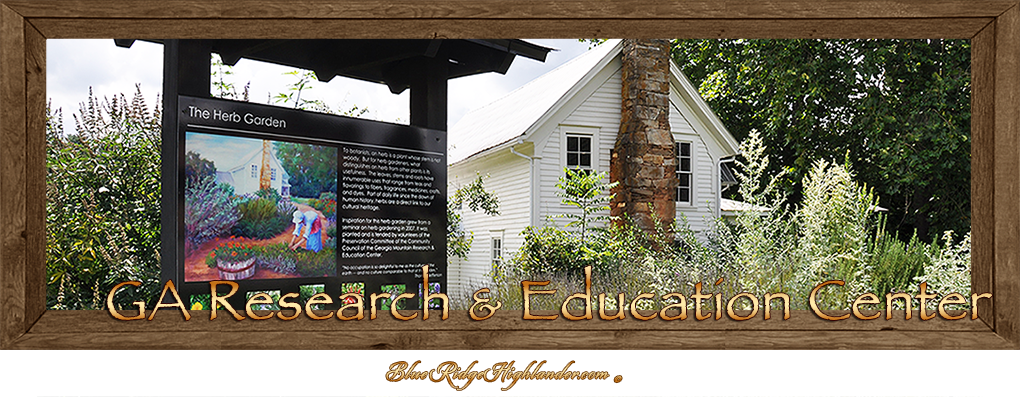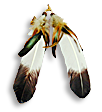Georgia Mountain Research and Education Center
This superb 415-acre property has been set aside for agricultural research, development and education, lies within the rolling foothills and farm lands in south central Union County. The Center is a branch of the University of Georgia’s Department of Agriculture. The Center’s focus is on the area’s bio-diverse nature of the Southern Appalachian Ecosystem, and how they can contribute to the survival of a great variety of plant species with properties suitable for medicinal, craft and culinary uses.
The Georgia Mountain Research and Interpretive Center saw its’ beginning in 1935 as the Jarrett Apple House & Orchards. Previously known as the historic Christa’s Farmhouse built in 1898. Today, gracing the front yard of the historic farmhouse, is a first-rate herb garden and informational kiosk.
There are other historic structures at the Research Center; 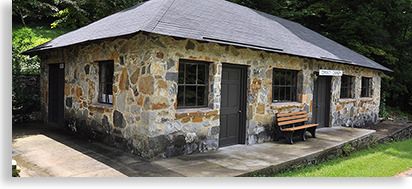 like the stone Community Cannery Interpretive Center, constructed in 1935. This building was renovated in 2009 and serves as a Visitor Center and classroom.
like the stone Community Cannery Interpretive Center, constructed in 1935. This building was renovated in 2009 and serves as a Visitor Center and classroom.
Additional featured structures are; a restored Spring House, a rustic outdoor amphitheater, a picnic pavilion and tables, an enclosed food preparation building, a stone outdoor fireplace with extended stone curved seating, a large green house and barn facility, the administration office and other out buildings.
Of the many special features at the Center, is the Georgia Mountain Ethno-Botanic Gardens and Woodland Medicine Trail. Many of the wild plants found in these two gardens were saved from the destructive forces of regional development projects.
The Woodland Medicine Trail is a 1/4-mile loop through a typical lower elevation Appalachian forest. At the beginning of 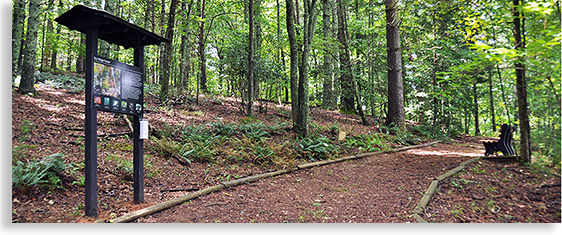 the trail is a rustic outdoor amphitheater for guided group tours. Along the trail there are woodland wildflowers, herbs, ferns and shrubs. Of the many plants and medicinal herbs encountered along the trail, the endangered Lady Slippers, a plant species that finds a home here, nurtured by the woodland surroundings and rich soil. These delicate plants are native to local soil, climate and elevation and cannot be transplanted in other geographical regions (they won’t survive). Lady Slippers are a unique beauty to behold and photograph, normally they are found only in the wild.
the trail is a rustic outdoor amphitheater for guided group tours. Along the trail there are woodland wildflowers, herbs, ferns and shrubs. Of the many plants and medicinal herbs encountered along the trail, the endangered Lady Slippers, a plant species that finds a home here, nurtured by the woodland surroundings and rich soil. These delicate plants are native to local soil, climate and elevation and cannot be transplanted in other geographical regions (they won’t survive). Lady Slippers are a unique beauty to behold and photograph, normally they are found only in the wild.
The Ethno-Botanic Garden is located across from the Woodland Trailhead. The colorful wild flowers in the garden 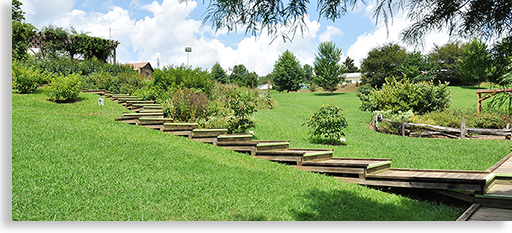 flourish, basking in the sunlight along the southern slope of a hill, while those needing more moisture thrive along the creek and in the bog garden. The plants contained in the garden are the types harvested and often cultivated by early regional inhabitants for a variety of medicinal, food, and craft uses. Upon entering the garden setting one passes through a covered trail-bridge crossing a small creek leading to a wooden deck trail. Crossing the covered bridge leaving the gardens, visitors will notice on the left rail a rustic birdhouse, push the button and it will tell you the story of the gardens. The platform trail travels either to the left, or right, then up the slope of the hill with individual terrace gardens located along the slope of the hill. The trail to the left also follows
flourish, basking in the sunlight along the southern slope of a hill, while those needing more moisture thrive along the creek and in the bog garden. The plants contained in the garden are the types harvested and often cultivated by early regional inhabitants for a variety of medicinal, food, and craft uses. Upon entering the garden setting one passes through a covered trail-bridge crossing a small creek leading to a wooden deck trail. Crossing the covered bridge leaving the gardens, visitors will notice on the left rail a rustic birdhouse, push the button and it will tell you the story of the gardens. The platform trail travels either to the left, or right, then up the slope of the hill with individual terrace gardens located along the slope of the hill. The trail to the left also follows 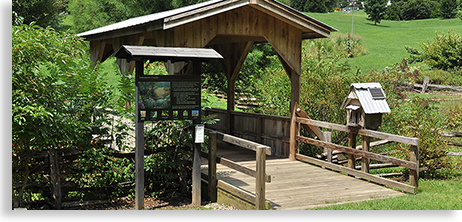 along the creek bank to a bog area. Bogs, or spring seeps, as they are also known, are mountain wetlands created on creek or stream floodplains, forming a unique water garden of wild plant life, a favorite to butterflies. The trail to the right also follows the creek to a bench swing fitted with covered roof. A wooden deck trail leads up the hill slope to a large vine covered trellis, fitted with benches.
along the creek bank to a bog area. Bogs, or spring seeps, as they are also known, are mountain wetlands created on creek or stream floodplains, forming a unique water garden of wild plant life, a favorite to butterflies. The trail to the right also follows the creek to a bench swing fitted with covered roof. A wooden deck trail leads up the hill slope to a large vine covered trellis, fitted with benches.
Another fine feature located at the Ethno-Botanic Garden, the Woodland Trail, and Jarrett Apple House & Herb Garden, are several informational kiosks, displaying a colorful mixed media rendition of each site and scene, created by local artist Zoe Schumaker.
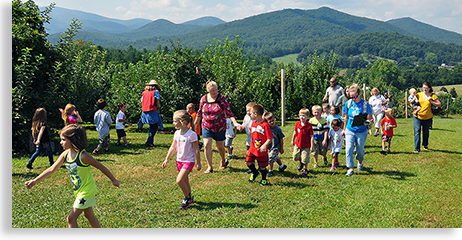 Throughout the Georgia Mountain Research and Education Center are additional gardens, a large apple orchard, and small vineyard. These research areas are only occasionally open to the general public. Each September the orchards host a ‘Johnny Apple Seed Event,’ opened to local schools for kindergarten children.
Throughout the Georgia Mountain Research and Education Center are additional gardens, a large apple orchard, and small vineyard. These research areas are only occasionally open to the general public. Each September the orchards host a ‘Johnny Apple Seed Event,’ opened to local schools for kindergarten children.
The Center offers educational programs for children and adults. Guided tours of the Ethno-Botanic Garden and Woodland Medicine Trail are offered every Monday from 9 am to 1 pm (May through September) except on holidays. Special group tours are available by appointment only.
For more information about these programs, email pbsgator@windstream.net.
Georgia Mountain Research and Education Center
195 Georgia Mountain Experiment Station Road • Blairsville, GA 30512
706.745.2655
